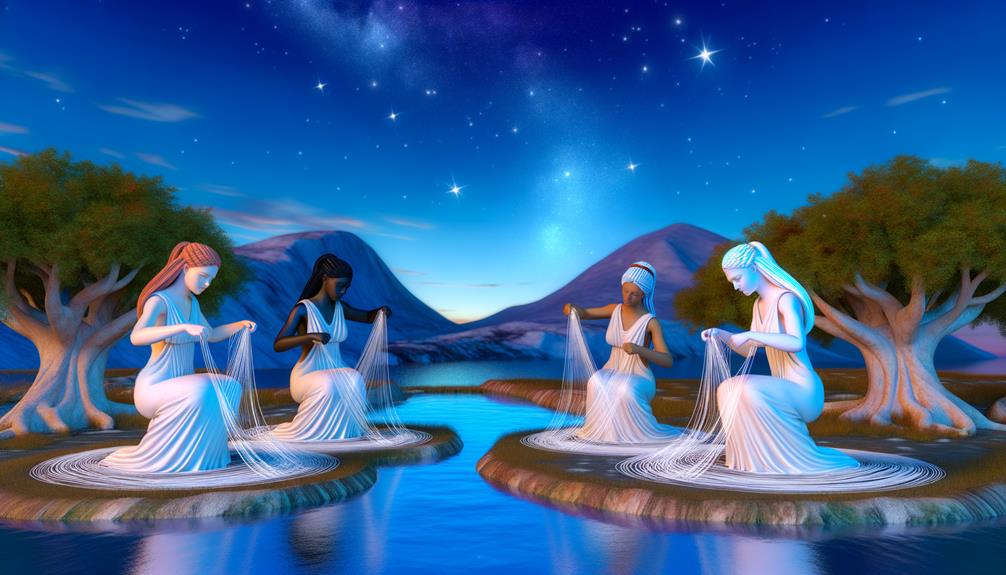Meaning of the Name Moira
The name Moira, derived from Greek mythology, is intimately tied to the Moirai, or Fates, who controlled the destinies of gods and mortals. Originating from the Greek word 'moira,' meaning 'portion' or 'share,' Moira embodies the concept of destiny and predestined paths.
The Moirai—Clotho, Lachesis, and Atropos—symbolized the spinning, measuring, and cutting of life's thread, reinforcing the inescapable nature of fate. Throughout history, Moira has maintained its significance in cultural, philosophical, and literary contexts, evolving into modern interpretations that still reflect themes of autonomy and destiny.
As we explore further, the name Moira's rich tapestry of meaning continues to unfold.

Key Takeaways
- Moira originates from Greek mythology, meaning 'portion' or 'share.'
- It is associated with the Fates, who controlled destinies from birth to death.
- The name symbolizes destiny and predestined paths in life.
- In Celtic traditions, Moira evolved to represent a noble woman.
- Modern interpretations link Moira to strong, independent characters.
Origins in Greek Mythology
The name Moira finds its origins in Greek mythology, where it is closely associated with the Moirai, also known as the Fates, who were deities responsible for determining the destinies of both gods and mortals.
Rooted in the Greek word 'moira,' meaning 'portion' or 'share,' the name signifies an allotted part in life, reflecting the ancient belief in predestined paths.
Each Moirai—Clotho, Lachesis, and Atropos—played a distinct role in spinning, measuring, and cutting the thread of life, underscoring the inevitability of fate.
This etymological connection imbues the name Moira with a profound sense of destiny and purpose, evoking the timeless human contemplation of life's predetermined course and the immutable forces that shape it.
Role of the Fates
The name Moira is intrinsically tied to the Greek mythological Fates, known as the Moirai, who are believed to control the destinies of both gods and humans.
Their significant role underscores the ancient Greek understanding of fate and predestination, reflecting the profound belief that destiny is preordained and immutable.
This association not only emphasizes the cultural importance of the Moirai but also highlights their enduring influence on the concept of destiny in Western thought.
Greek Mythological Significance
Intriguingly, the name Moira is deeply entwined with the Greek mythological figures known as the Fates, who were believed to control the destiny of both gods and mortals.
These three sisters—Clotho, Lachesis, and Atropos—were tasked respectively with spinning the thread of life, measuring its length, and ultimately cutting it. Their roles were fundamental in the Greek worldview, emphasizing the inescapable nature of fate and destiny.
The term 'Moira' itself translates to 'part' or 'share,' signifying the portion of life allotted to each individual. This etymological connection underscores the profound influence these deities exerted over human existence, encapsulating the ancient Greek belief in predetermined destiny and the cosmic order governing all beings.
Influence on Destiny
Building upon the mythological significance of the Fates, their profound influence on destiny was reflected in how they meticulously controlled the life span and fate of every individual, from birth to death.
The three Moirai—Clotho, Lachesis, and Atropos—each had a distinct role: Clotho spun the thread of life, Lachesis measured it, and Atropos cut it. This tripartite structure symbolized the inescapable and predetermined nature of human existence.
They underscored the Greek belief in an immutable destiny, regardless of personal actions or desires. The Fates' dominion over life and death emphasized the limitations of human agency, illustrating a cosmos where divine order prevailed, and every individual's path was irrevocably charted by these ancient arbiters.
Historical Significance
Tracing its origins back to ancient Greek mythology, the name Moira holds significant historical weight as it was used to personify fate and destiny.
In classical literature, the Moirai, often referred to as the Fates, were three deities—Clotho, Lachesis, and Atropos—who controlled the thread of life from birth to death. Clotho spun the thread, Lachesis measured it, and Atropos cut it, symbolizing the inescapable nature of destiny.
This triad underscored the ancient Greeks' belief in predetermined outcomes, influencing everything from daily life to philosophical thought.
The name Moira itself became synonymous with the concept of unavoidable fate, deeply embedded in both mythological narratives and the collective consciousness, highlighting its profound historical significance.
Cultural Influences
The name Moira, steeped in ancient Greek mythology, has transcended its historical roots to influence various cultural contexts throughout the centuries. Derived from the Greek word for 'fate' or 'destiny,' Moira is deeply connected to the Moirai, the three Fates who controlled human destiny.
This mythological foundation has permeated literature, art, and philosophy, symbolizing the inexorable nature of destiny across cultures. In Celtic traditions, Moira evolved to signify a noble woman, merging myth with local customs.
Modern literary works and theatrical productions frequently employ the name to evoke themes of fate and inevitability. The multifaceted cultural influences of the name Moira underscore its enduring resonance and adaptability in conveying profound existential concepts.
Modern-Day Interpretations
In contemporary society, the name Moira has undergone a nuanced evolution, often symbolizing themes of autonomy and self-determination while retaining its mythological connotations of fate and destiny. This duality reflects a modern understanding where individuals are seen as architects of their own lives, yet still bound by certain existential threads.
The name's etymological roots in Greek mythology add layers of depth, connecting the bearer to a rich cultural heritage.
- Symbol of Empowerment: Moira is increasingly associated with strong, independent characters in literature and media.
- Cultural Resonance: The name maintains its mythological significance, linking past and present interpretations.
- Personal Identity: Moira serves as a poignant reminder of the balance between fate and free will in contemporary narratives.
Popularity and Usage
While Moira's modern-day interpretations enrich its cultural and personal significance, its popularity and usage in contemporary society offer further insights into its enduring appeal. Historically rooted in Greek mythology, the name Moira has experienced varying degrees of popularity across different regions and periods. Analyzing its usage trends reveals intriguing patterns:
| Year | Rank (USA) | Births (USA) |
|---|---|---|
| 2000 | 942 | 250 |
| 2010 | 815 | 320 |
| 2020 | 1035 | 205 |
| 2022 | 1120 | 190 |
The data indicates a fluctuating yet persistent presence in naming charts, suggesting a niche but loyal following. Factors such as cultural revival and media representation contribute to its sporadic resurgence, reflecting Moira's timeless resonance in modern nomenclature.
Conclusion
The name Moira, rooted in Greek mythology and associated with the Fates, encapsulates a rich tapestry of historical and cultural significance.
Like a thread woven into a grand tapestry, its influence permeates various cultural contexts and modern interpretations.
For instance, in ancient texts, Moira symbolized the inescapable destiny of individuals, much like how each thread in a tapestry contributes to the overall design.
Today, the name continues to be a popular choice, reflecting its enduring legacy.






